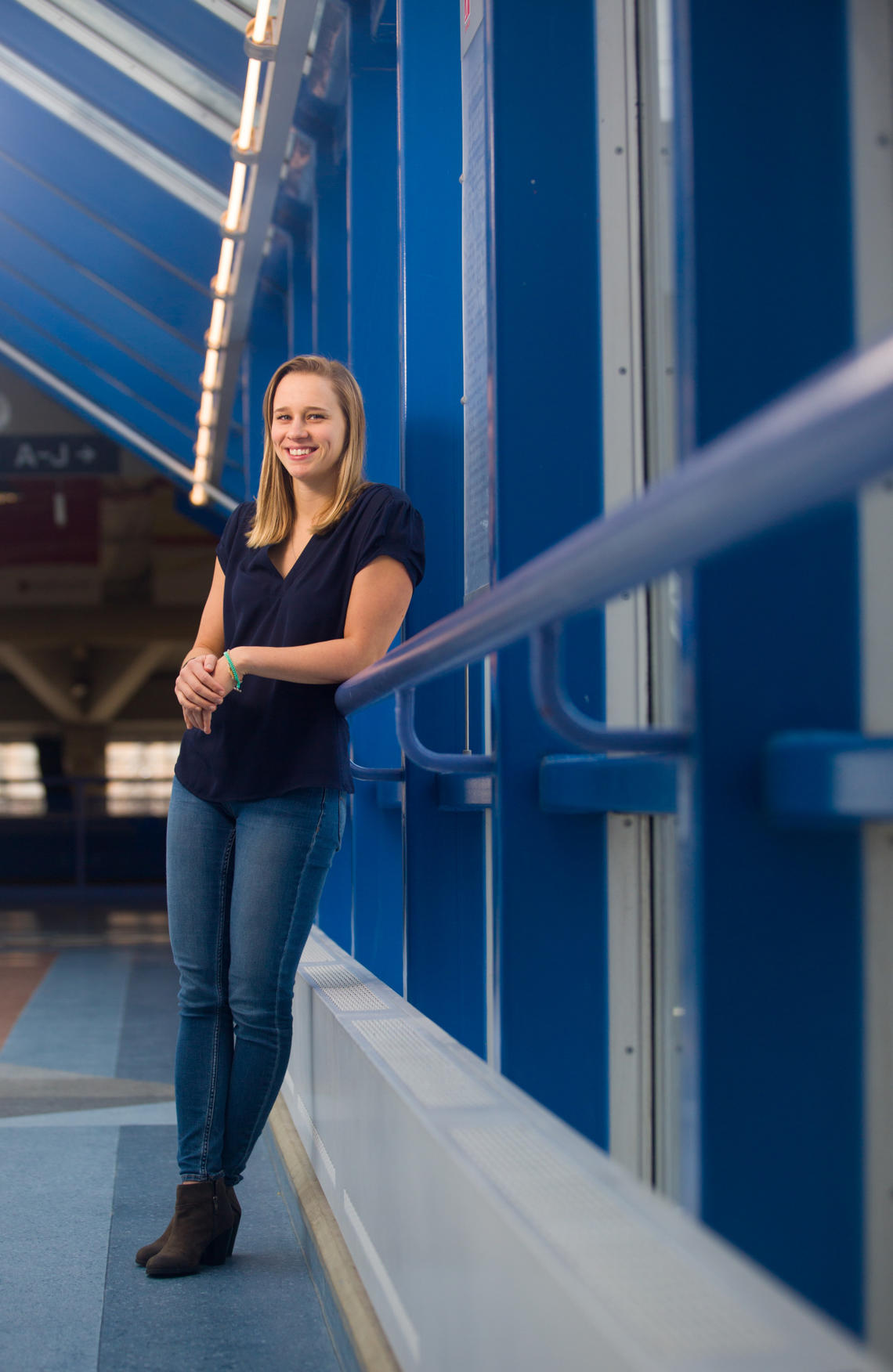Nov. 14, 2018
Class of 2018: Former Dinos student athlete brings her work ethic to the lab bench

Calaine Inglis is receiving her Master of Science degree at the fall 2018 convocation ceremony.
Riley Brandt, University of Calgary
In typical hockey-player fashion, Calaine Inglis insists on crediting the team for her success.
Except while Inglis was indeed an important part of winning Dinos hockey teams throughout her undergraduate studies, today her team is a group of scientists studying the cardiovascular system, and her supervisor Dr. Juan Murias, PhD, assistant professor in the Faculty of Kinesiology.
“I’m very lucky to work with Juan, and to collaborate and learn from my colleagues; I wouldn’t be where I am without them,” Inglis says. “Juan is always making time for us, really above and beyond, whether that’s giving feedback on papers, sending us to conferences, and just putting students first.”
Inglis convocates Nov. 16 with an MSc in Kinesiology, having completed an MKin in applied exercise physiology in 2016 and a BSc in Kinesiology in 2014, both also at the University of Calgary. She’s now enrolled in a PhD program, and will continue her research in Murias’s lab studying how the body extracts oxygen at the level of the muscle in highly trained athletes and in aging and other populations.
Never close the door
On the transition from taking an applied master’s to the thesis-based master’s degree she’s just completed, Inglis says the idea of pursuing research initially intimidated her but that the more she learned the more interesting it became.
“I think the take-home message for me was not to close the door on the idea of research before seeing what it’s all about,” Inglis says. “A lot of people have in mind that you are kind of stuck at a workbench, doing the same thing, and working alone.
“My actual experience was just the opposite: We work with people, interacting with them in a clinical and high-performance setting, and I am applying what I learned from my undergrad and the MKin into a real setting.”
The research Inglis has been doing for her MSc grew out of her interest in sports. She was used to training for hockey — and also as a member of the Dinos rowing team — and she had experience training other athletes, most recently as co-owner and head instructor of High Tempo Female Hockey Camps in Edmonton.
Following her curiosity
“I always wanted to learn more, to know more, to understand why,” Inglis says. “I started along this path because I liked my exercise physiology classes in undergrad, and I have just kept asking questions and following my interest and curiosity all the way to the PhD.”
Inglis researches how the body gets oxygen into muscles, and how the muscles extract that oxygen. During her MSc, her main thesis project identified the reserve in oxygen extraction, and she also did a study evaluating and testing a group of cyclists training for competition, examining oxygen transport during intense or peak exercise, and looked at how that oxygen extraction was modified by training.
What she learned was that while there is a plateau in oxygen extraction during peak exertion, there is actually a reserve of oxygen in the bloodstream that remains untapped. The question she’s striving to answer next is why?
“What we see in incremental tests to exhaustion is that there is a plateau in oxygen extraction,” Murias explains. “Some people argue that that’s the physiological upper limit. Calaine’s work has contributed to understanding that there is a functional reserve for oxygen extraction but for some reason it is not used. And finding out why is where she’ll go next with her research.”
Pursuing an international exchange
As a student-athlete Inglis couldn’t pursue an international exchange, which had always interested her. As a graduate student researcher, her work has taken her to conferences all over the world, she volunteered at a lab in Verona, Italy, and this year she worked for four months at a lab at the University of Las Palmas of Gran Canaria.
“It is really interesting to see how they approach research and how differently a lab can be set up. I’ve learned so much from the people I’ve met and had the privilege to work with,” Inglis says.
Inglis has earned multiple scholarship and awards including an NSERC Graduate Doctoral Scholarship, NSERC foreign study grant and the NSERC master’s student award, and an Eyes High Doctoral Recruitment scholarship. With so much success, Murias smiles when he says the only experience Inglis might be lacking is how to cope with rejection.
“Calaine is a working machine, she’s committed, she’s focused,” Murias says. “Normally a master’s student graduates with enough research material for one publication, sometimes two. Calaine graduated with one published paper as first author, four co-authored papers, two first-authored submitted papers, and she has material for two more manuscripts. She’s exceptional. Not only that, she’s a positive and enthusiastic person people enjoy working alongside.”
For her PhD Inglis plans to continue studying the physiology of oxygen extraction, extending her master’s research and perhaps make it more of a training study, learning how to actually improve some aspects of fitness. Beyond that, she doesn’t like to predict.
“Whenever I’m into something I don’t want to focus too far in the future,” Inglis says. “I do whatever I’m doing to the best of my ability. So far it’s worked out that when I’m doing that, that’s when I find the opportunities, that’s when the different doors open.
